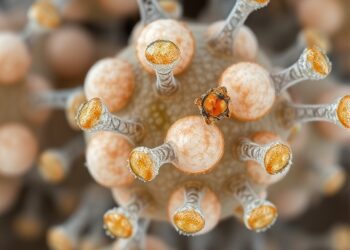In an unprecedented advancement in malaria research, a team of scientists has meticulously charted the entire genetic landscape of Plasmodium knowlesi, a notorious malaria-causing parasite that also poses significant threats to human health. This groundbreaking study illuminates the genetic underpinnings required for the parasite’s survival in human hosts and elucidates the intricate mechanisms underlying its resistance to conventional antimalarial therapies. The research was conducted by experts at the Harvard T.H. Chan School of Public Health, collaborating across multiple prestigious institutions, and represents a substantial leap forward in our understanding of this complicated organism.
The findings stem from an innovative application of transposon mutagenesis, a potent genetic technique that allows researchers to systematically disrupt specific genes. This method enabled the scientists to unveil a comprehensive catalog of essential genes within P. knowlesi, thus providing new insights into how this pathogen thrives and evades treatment. Through their rigorous experimentation, they were able to identify those genetic elements critical for the parasite’s lifecycle in human red blood cells—a crucial phase that underpins malaria pathology.
This extensive genetic mapping is not merely academic. It holds vital implications for public health and medical practice, particularly in combatting the mounting challenge posed by drug-resistant strains of Plasmodium. With the threat of malaria claiming nearly 608,000 lives worldwide each year, researchers are acutely aware that addressing drug resistance is paramount. The newly identified genetic targets that contribute to this resistance could inform the development of novel therapeutic strategies, essentially enhancing our arsenal against the evolving parasite.
Prominent co-corresponding author Manoj Duraisingh emphasized the urgent need for effective interventions, stating that the emerging resistance to current antimalarial medications poses an escalating threat. The genetic map serves not only as a resource for infectious disease researchers but also lays the groundwork for future explorations into the biology of malaria parasites, thereby driving the search for innovative treatments.
A significant aspect of this research lies in the evolutionary relationship between various Plasmodium species. The findings from P. knowlesi could inadvertently provide critical insights into other malaria-causing organisms, particularly Plasmodium vivax. Despite being less studied due to its recalcitrance to laboratory culture methods, understanding the genetic framework revealed in P. knowlesi could heighten efforts aimed at the elimination of P. vivax and other related species.
The sheer volume of essential genes cataloged in this study outstrips any previous mappings from other Plasmodium species. Researchers underscore the importance of this extensive dataset, as it not only reveals the genetic necessities for the parasite’s growth but also provides a roadmap for the functional analysis necessary for highlighting significant resistance mechanisms. Each identified gene offers potential targets for drug developers who are relentlessly working to devise next-generation antimalarials.
Moving forward, this comprehensive genetic mapping will enable scientists to develop strategies to monitor and contain the emergence of drug-resistant strains. Such strategies will be critical in developing new public health frameworks to tackle malaria, particularly in regions where P. knowlesi infection is on the rise. Given its zoonotic nature, the bridge between animal reservoirs and human illness is crucial for formulating effective epidemiologic interventions.
Furthermore, the multidisciplinary team of researchers involved in this study included a range of specialists, each contributing unique insights that culminated in this expansive mapping project. The collaborative spirit exhibited highlights the importance of diverse expertise in addressing complex biological questions. Through their rigorous examination and the synthesis of various scientific approaches, the research promotes integrated methodologies that could become a model for future studies in infectious disease contexts.
As this research progresses toward publication later in the year, the hype surrounding the potential applicability of these findings builds significantly. Significantly, it not only contributes to the scientific community’s understanding of P. knowlesi, but also promises to fuel ongoing discussion about malaria’s pervasive burden on global health—a challenge that demands urgent action and novel solutions.
In summary, the extensive genetic profiling of P. knowlesi marks a critical milestone in malaria research. By establishing direct connections between specific genes and their roles in both drug resistance and parasite survival, researchers have taken definitive strides toward tailoring targeted interventions. Truly, the impact of this work could resonate for years to come, catalyzing further innovations that upscale the battle against malaria.
Through this research, a clearer picture of the essential genomic elements guiding P. knowlesi biology emerges, laying a foundation for future breakthroughs in malaria treatments. Scientists posit that tailoring future research to explore these genetic avenues could very well lead to the generation of new compounds capable of outsmarting this evolving parasite, ultimately changing the trajectory of malaria therapy.
Rather than being just a matter of scientific curiosity, this study hands researchers a vital tool in their arsenal as they combat one of the deadliest infectious diseases in the world. As both a resource for current research and a cornerstone for future investigations, this genetic map heralds a new era in our understanding and treatment of malaria.
Subject of Research:
Plasmodium knowlesi genetics
Article Title:
The essential genome of Plasmodium knowlesi reveals determinants of antimalarial susceptibility
News Publication Date:
6-Feb-2025
Web References:
Harvard T.H. Chan School of Public Health
References:
Elsworth, B., Ye, S., Dass, S., Tennessen, J. A., Sultana, Q., Thommen, B. T., Paul, A. S., Kanjee, U., Grüring, C., Ferreira, M. U., Gubbels, M.-J., Zarringhalam, K., Duraisingh, M. T. (2025). The essential genome of Plasmodium knowlesi reveals determinants of antimalarial susceptibility. Science. doi: 10.1126/science.adq6241
Image Credits:
Not provided




